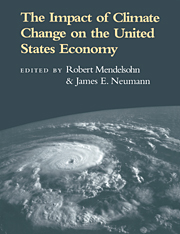Book contents
- Frontmatter
- Contents
- List of Contributors
- Acknowledgements
- 1 Introduction
- 2 Economic effects of climate change on US agriculture
- 3 The impact of climate variation on US agriculture
- 4 Climate change and agriculture: the role of farmer adaptation
- 5 The impacts of climate change on the US timber market
- 6 Economic effects of climate change on US water resources
- 7 The economic damage induced by sea level rise in the United States
- 8 The impact of global warming on US energy expenditures
- 9 The economic impact of climate change on the US commercial fishing industry
- Introduction to recreation
- 10 The impact of climate change on outdoor recreation
- 11 Estimated effects of climate change on selected outdoor recreation activities in the United States
- 12 Synthesis and conclusions
9 - The economic impact of climate change on the US commercial fishing industry
Published online by Cambridge University Press: 21 October 2009
- Frontmatter
- Contents
- List of Contributors
- Acknowledgements
- 1 Introduction
- 2 Economic effects of climate change on US agriculture
- 3 The impact of climate variation on US agriculture
- 4 Climate change and agriculture: the role of farmer adaptation
- 5 The impacts of climate change on the US timber market
- 6 Economic effects of climate change on US water resources
- 7 The economic damage induced by sea level rise in the United States
- 8 The impact of global warming on US energy expenditures
- 9 The economic impact of climate change on the US commercial fishing industry
- Introduction to recreation
- 10 The impact of climate change on outdoor recreation
- 11 Estimated effects of climate change on selected outdoor recreation activities in the United States
- 12 Synthesis and conclusions
Summary
As scientists become more certain that increases in concentrations of greenhouse gases will change climate, there has been growing interest in the potential economic effect of climate change. While the National Oceanic and Atmospheric Administration (NOAA) has sponsored investigations into the potential consequences of global climate change on fisheries, fisheries have received very limited attention in previous climate change damage assessments. For example, the two most commonly cited surveys of the effect of climate change on the US economy, Nordhaus (1991) and Cline (1992), provide no estimate of potential effects on the fisheries sector, although Nordhaus lists agriculture, forestry, and fisheries as economic sectors that could be severely affected by climate change.
On one level, the lack of attention to the potential effects on fisheries is understandable. First, fisheries and aquaculture are relatively small sectors of the US economy. The US fishery sector is a $3 billion contributor in a $5 trillion economy. Second, while there has been much research observing the changes in climate, there has been much less work done describing how the oceans will respond to increases in concentrations of greenhouse gases. Third, the link between ocean conditions and fisheries is complex and poorly understood. Major uncertainties and gaps in understanding make it particularly difficult to quantify the effect of global climate changes on the stocks of commercially important fish species.
- Type
- Chapter
- Information
- The Impact of Climate Change on the United States Economy , pp. 237 - 264Publisher: Cambridge University PressPrint publication year: 1999
- 3
- Cited by

